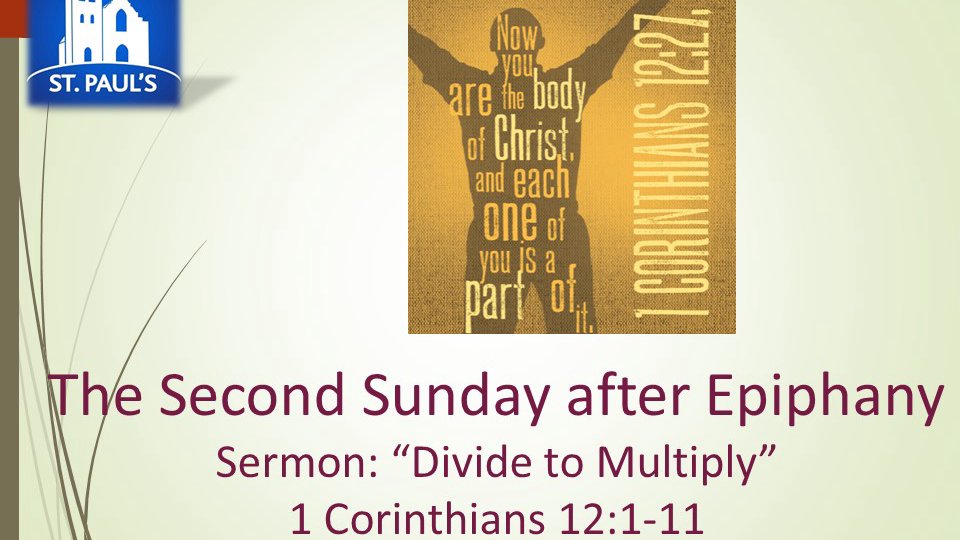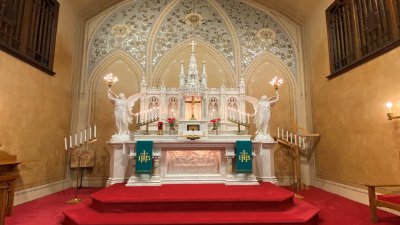Every year, the Epiphany of Our Lord is announced by the coming of the Magi from the East (on January 6) and the Baptism of Our Lord on the following Sunday. Likewise, every year on the next Sunday, John summarizes the significance of what we will hear concerning the earthly ministry of Jesus leading to the glory of His cross. Jesus enacts His first sign or miracle at a wedding in Cana. Turning water into wine signifies more than the joy of the marriage of God to His people. To Christians, it instantly calls to mind the Means by which God literally pours the new life of forgiveness into us through the blood of the cross of Christ. As the Bride of Christ, the Holy Church is empowered by the Holy Spirit to live a life of the reverent worship of God and loving service of one another and the world. The one Spirit works through the many members of the Body of Christ.

01162022 Praise Service
Sermon: Divide to Multiply” 1 Corinthians 12:1-11
January 16, 2022 • 1 Corinthians 12:1–11
04/14/24 Praise Service
April 14, 2024
AS WE GATHER “Amazing” is a commonly used word in the English that has a rich history. It came into common usage in the 14th century as a variant of the older root word “amasod,” which meant stupefied or confounded or overwhelmed with sudden surprise or wonder. The word “amazing” shows up several times in hymns that we sing—from describing the action of God in the birth of Jesus as “love amazing” (LSB 375:1) to bringing to our hearts and minds that in His suffering to pay the price of our sins, our Lord showed “amazing pity” (LSB 437:2). Two other hymns refer to the “amazing grace” of God (LSB 744:1; 558:2), and in another hymn, the author of the text rejoices that God “has done amazing things to me” (LSB 934:2). The season of Easter is a time for us to be truly amazed and filled with the praise of our amazing Lord!
04/14/24 traditional Service
April 14, 2024
AS WE GATHER “Amazing” is a commonly used word in the English that has a rich history. It came into common usage in the 14th century as a variant of the older root word “amasod,” which meant stupefied or confounded or overwhelmed with sudden surprise or wonder. The word “amazing” shows up several times in hymns that we sing—from describing the action of God in the birth of Jesus as “love amazing” (LSB 375:1) to bringing to our hearts and minds that in His suffering to pay the price of our sins, our Lord showed “amazing pity” (LSB 437:2). Two other hymns refer to the “amazing grace” of God (LSB 744:1; 558:2), and in another hymn, the author of the text rejoices that God “has done amazing things to me” (LSB 934:2). The season of Easter is a time for us to be truly amazed and filled with the praise of our amazing Lord!
04/07/24 Traditional Service
April 7, 2024
AS WE GATHER When Thomas finally met Jesus, alive again after Easter, he went from demanding proof to a personal confession of faith, “My Lord and my God.” It would have been a different story had the news been false. The rest of the Jerusalem congregation truly exhibited Easter faith when they became a welcoming community, one that shared with newcomers whatever they needed. The news was unbelievable, but so were the responses—in word and deed as faith saw the freeing truth: we need fear nothing, not even death. We have heard the news as well. How shall we respond?





